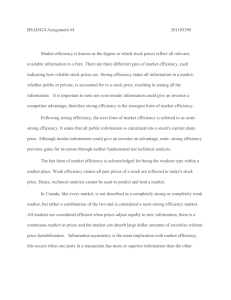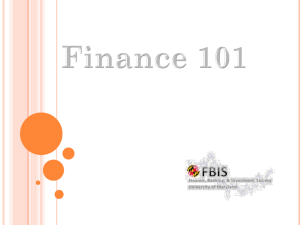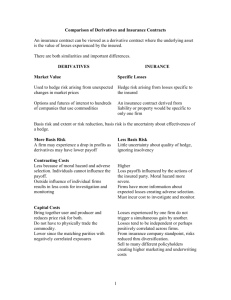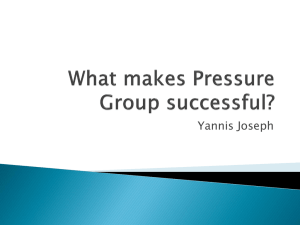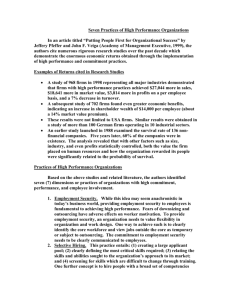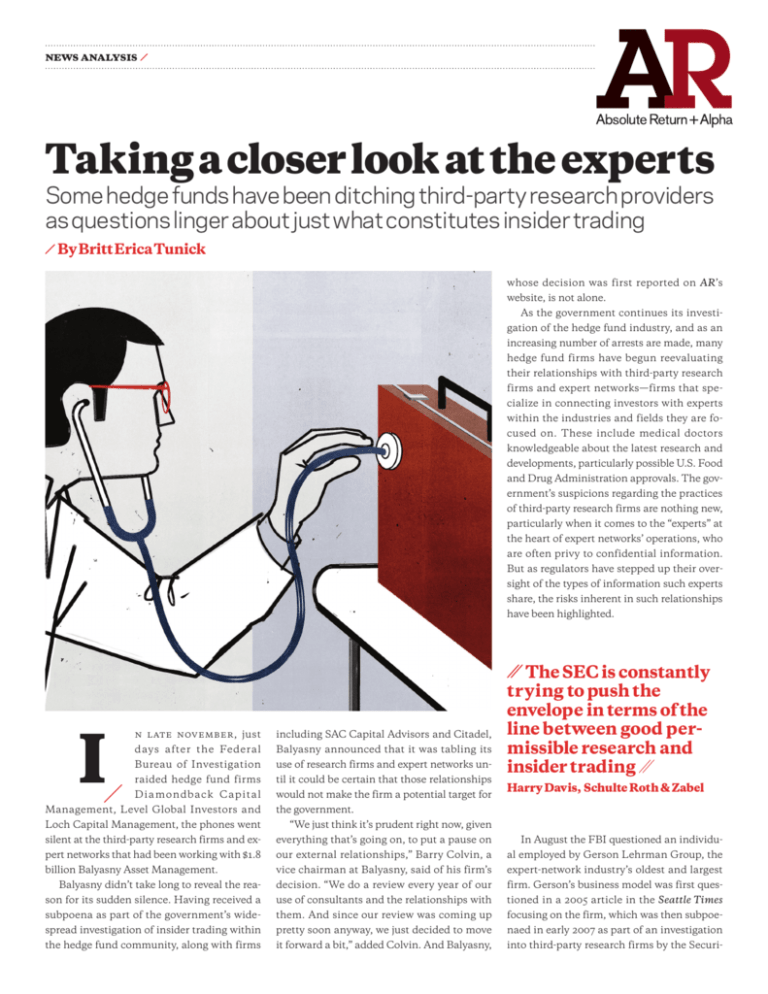
News Analysis
Taking a closer look at the experts
Some hedge funds have been ditching third-party research providers
as questions linger about just what constitutes insider trading
By Britt Erica Tunick
whose decision was first reported on AR’s
website, is not alone.
As the government continues its investigation of the hedge fund industry, and as an
increasing number of arrests are made, many
hedge fund firms have begun reevaluating
their relationships with third-party research
firms and expert networks—firms that specialize in connecting investors with experts
within the industries and fields they are focused on. These include medical doctors
knowledgeable about the latest research and
developments, particularly possible U.S. Food
and Drug Administration approvals. The government’s suspicions regarding the practices
of third-party research firms are nothing new,
particularly when it comes to the “experts” at
the heart of expert networks’ operations, who
are often privy to confidential information.
But as regulators have stepped up their oversight of the types of information such experts
share, the risks inherent in such relationships
have been highlighted.
I
n late November, just
including SAC Capital Advisors and Citadel,
days after the Federal
Balyasny announced that it was tabling its
Bureau of Investigation
use of research firms and expert networks un-
raided hedge fund firms
til it could be certain that those relationships
D ia m o n d b a c k C a p i tal
would not make the firm a potential target for
Management, Level Global Investors and
The SEC is constantly
trying to push the
envelope in terms of the
line between good permissible research and
insider trading
Harry Davis, Schulte Roth & Zabel
the government.
Loch Capital Management, the phones went
“We just think it’s prudent right now, given
silent at the third-party research firms and ex-
everything that’s going on, to put a pause on
In August the FBI questioned an individu-
pert networks that had been working with $1.8
our external relationships,” Barry Colvin, a
al employed by Gerson Lehrman Group, the
billion Balyasny Asset Management.
vice chairman at Balyasny, said of his firm’s
expert-network industry’s oldest and largest
Balyasny didn’t take long to reveal the rea-
decision. “We do a review every year of our
firm. Gerson’s business model was first ques-
son for its sudden silence. Having received a
use of consultants and the relationships with
tioned in a 2005 article in the Seattle Times
subpoena as part of the government’s wide-
them. And since our review was coming up
focusing on the firm, which was then subpoe-
spread investigation of insider trading within
pretty soon anyway, we just decided to move
naed in early 2007 as part of an investigation
the hedge fund community, along with firms
it forward a bit,” added Colvin. And Balyasny,
into third-party research firms by the Securi-
News Analysis
ties and Exchange Commission and the New
selling a security, in breach of a fiduciary duty
industry that the real target of the govern-
York attorney general’s office.
or other relationship of trust and confidence,
ment’s investigation is Steve Cohen’s SAC,
On November 2 the SEC charged Yves
while in possession of material, nonpublic
one of the hedge fund industry’s biggest users
Benhamou, a Paris doctor who specializes in
information about the security. Insider trad-
of third-party research firms and expert net-
liver diseases, for tipping off a fund manager
ing violations may also include ‘tipping’ such
works. Cohen’s trading practices have long
at Morgan Stanley subsidiary FrontPoint Part-
information, securities trading by the person
been controversial.
ners about negative unpublished findings of a
‘tipped,’ and securities trading by those who
drug trial in early 2008. And fallout from the
misappropriate such information.”
SAC reportedly spends as much as $400
million of annual trading commissions to en-
October 2009 charges levied against Galleon
The Internet and heightened public disclo-
sure that its information network—which has
Group continues to mount. Early last month
sure requirements have made more informa-
included expert-network firm Gerson Leh-
the SEC filed civil charges against hedge fund
tion available on publicly listed companies.
rman—all but guarantees that SAC traders
firm Trivium Capital Management and the
As a result, some of the more aggressive re-
receive the first news of anything to do with
firm’s co-founder Robert Feinblatt; Jeffrey Yo-
search tactics have occasionally strayed into
the companies they follow.
kuty, a Trivium analyst; Sunil Bhalla, a former
gray areas.
In January 2009 the SEC filed a complaint
executive at technology company Polycom;
One popular research method hedge funds
against former Blackstone Group managing
and Shammara Hussain, a consultant at in-
have been utilizing is known as mosaic the-
director Ramesh Chakrapani, who is said to
vestor relations firm Market Street Partners
ory, which involves a process of looking at
have given information about Supervalu’s
who did work for Google.
multiple pieces of information—both public
2006 acquisition of grocery chain Albertsons
The number of individuals charged as
information and nonpublic nonmaterial in-
to his friend Jonathan Hollander, a trader at
part of the Galleon case now totals 24, with
formation—in order to create a thesis for a
SAC’s CR Intrinsic Investors, which takes lon-
17 people having pleaded guilty so far. The
specific company. Such research is not limited
ger-term positions than the main SAC fund.
latest big name to plead out was Danielle
to facts and can include the opinions of indi-
Chiesi, who had worked for hedge fund New
viduals in a company’s specific sector.
Castle and also had close ties to Galleon’s
founder Raj Rajaratnam.
SAC turned Hollander in after an internal investigation uncovered his activities,
“In a world of black and white, [mosaic
yet industry observers and some former SAC
theory] is very firmly in the white category.
employees believe the firm was simply trying
When it comes to research firms, Primary
It’s the type of good research one would ex-
to allay regulators’ suspicions about its prac-
Global Research—an expert-network firm
pect of anyone, especially one who is a fidu-
tices. And after regulators began paying a bit
whose specialty areas include health care,
ciary,” Davis says.
too much attention to SAC’s research network
technology, financial services, energy, real
He notes that the U.S. Supreme Court en-
roughly two years ago, the firm said it had sev-
estate and alternative energy—has been hit
dorsed the importance to the securities mar-
ered ties to several of the expert networks it
hardest by the government’s probe.
kets of good research in the 1983 case of Dirks
had been using. SAC has repeatedly denied all
So far, seven people affiliated with Pri-
vs. the SEC. But with so much information
accusations of any wrongdoing.
mary Global have been charged with insider
available these days, hedge funds are trying
Although landing a big fish like Cohen
trading activities, most recently in mid-De-
to make sure that the nonpublic material
would no doubt make any prosecutor’s ca-
cember, when the FBI arrested four individu-
that is part of such research would truly be
reer, some think it’s coincidental that SAC has
als tied to the firm and accepted a guilty plea
deemed nonmaterial by regulators.
been tangentially connected to the scandals.
from a fifth for charges ranging from conspir-
The line can get a bit blurrier with another
Ron Geffner, a partner at law firm Sadis &
acy and wire fraud to providing confidential
popular research tactic, known as channel
Goldberg, believes SAC has simply found it-
information.
checks. In this case, analysts examine the
self caught up in the insider trading scandal
As a result of regulators’ heightened over-
channels used to distribute a product or ser-
that brought down Galleon in 2009. SAC has
sight and the latest arrests in the insider
vice to determine retail demand and poten-
been loosely tied to Galleon’s demise since
trading investigation, hedge funds are reex-
tial revenue, which can directly affect share
regulators revealed that Richard Choo-Beng
amining which research practices could po-
price. Using this approach, a researcher try-
Lee, a cooperating witness in the case, was a
tentially be deemed insider trading. “The SEC
ing to form an opinion of a company that
former SAC trader who agreed to provide de-
is constantly trying to push the envelope in
produces handheld computers might head to
tails of any insider trading activities he may
terms of the line between good permissible re-
stores that carry the devices to observe cus-
have participated in during the decade before
search and insider trading,” says Harry Davis,
tomers’ reactions to the product.
his arrest, including several years at SAC.
Davis says that the practice falls within
Lee’s cooperation with the government led
“The law in this area has developed through
regulators’ definition of permissible activ-
to this past November’s arrest of Don Ching
case law—decisions made by judges in cases
ity—as long as researchers don’t compel em-
Trang Chu, an employee of Primary Global,
brought by the SEC and the Department of
ployees of a store to reveal sales information
for allegedly passing on insider information.
Justice. For its part, the SEC has continued its
that would otherwise remain confidential
Five more employees of Primary Global have
mission by trying to bring cases it believes are
and create a situation that could be consid-
since been charged as part of the govern-
appropriate, which include cases that seek to
ered insider information.
ment’s insider trading investigation, making
a partner at law firm Schulte Roth & Zabel.
expand the law in this area,” he says.
Beyond the research practices that hedge
According to the SEC’s definition, illegal
fund firms rely on for their investment activi-
insider trading “refers generally to buying or
ties, there is a strain of thinking within the
it one of the few research firms to have lost
several clients in recent weeks.
“The principals of hedge fund firms have
had a shot fired across their bow, and they run
dermine that theory, it isn’t good for the capi-
the risk of not only being prosecuted for their
tal markets, and it doesn’t promote efficiency
or procedures that are appropriate to protect
their clients, but do they actually do them
own individual actions, but potentially being
and fairness,” says Gould. “There’s nothing
and do they have a culture within the orga-
prosecuted for the actions of their subordi-
wrong with legitimate research, and there’s
nization that is compliance focused,” says
nates,” says Geffner, noting that it is not sur-
nothing wrong with an organization that puts
Mayhew.
prising hedge fund firms are trying to distance
legitimate consultants and people who are ex-
Because of that, he says, many hedge
themselves from research firms or expert net-
perts in their fields in touch with people who
funds have taken to asking the research firms
works whose names have been tarnished by
are trying to learn that area or find out about a
they partner with to complete annual and
the insider trading investigation.
particular set of circumstances,” he adds.
sometimes even biannual questionnaires
“Under Dodd-Frank’s aiding-and-abetting
about their compliance practices. These sur-
violations, the standard-of-care burden has
veys can include up to 50 different questions
broadened,” he says, meaning that hedge
funds could potentially be held liable for actions of their third-party research partners
considered to be insider trading, even if they
are unaware of them.
The more popular theory among hedge
funds—and one many larger firms with welldocumented compliance practices have been
using to try to gain an edge over their competitors—is that the government may be attempting to expand the definition of insider
There is some thinking that the SEC may
not be trying to change
the insider trading
definition, but that the
attorney general may
have a different agenda
Michael Mayhew, Integrity Research
on firms’ efforts to ensure they are compliant
with regulators’ guidelines.
“Firms are trying to make sure they’ve got
a handle on their own internal compliance
policies and, at the same time, are doing
audits of their research partners’ policies.”
Nonetheless, he says the impact of the government probe has actually been less significant for researchers than might be expected.
Though a handful of firms (such as Loch
Capital Management) have followed the lead
of Balyasny and temporarily stopped using
trading beyond the existing laws. “There is
expert networks, they have lost few clients
some thinking that the SEC may not be trying to change the insider trading definition,
By educating hedge fund firms about its
but that the attorney general may have a
practices, the research industry has been ag-
overall. Since news broke of the government’s latest round of raids and subpoenas,
different agenda,” says Michael Mayhew,
gressively trying to distance itself from its few
transaction volume across the entire research
chairman and director of research for Integ-
members who have been embroiled in the in-
industry is down less than 5%, according to
rity Research Associates, which tracks the
sider trading scandals. According to Mayhew,
Integrity Research.
research industry.
many research firms have hired law firms to
The full impact of the scandals on firms is
Jay Gould, a partner at Pillsbury Winthrop
review their compliance processes and pro-
uncertain. FrontPoint was hit with redemp-
Shaw Pittman, believes the government’s
duce reports on the findings for hedge fund
tions of as much as $3 billion and was forced
investigation is little more than an effort to
clientele. What hedge funds are looking for is
to liquidate its health care fund after one of
enforce the insider trading rules initially es-
evidence that employee training at research
its managers was linked to the scandal. Yet
tablished as part of the Securities Exchange
firms and expert networks details what is and
in early January the firm raised more than
Act of 1934, and any adaptations since, to
is not considered insider trading and that in-
$1 billion for a new loan fund. Weeks later,
ensure that the public securities markets are
dividuals are contractually held accountable
however, Steven Eisman, one of the firm’s
transparent and that everyone is working
to follow regulators’ guidelines.
highest-profile managers, was said to be
from the same information.
“One of the really big questions that is out-
“If you have people who are trying to un-
standing is not just, do the firms have policies
planning to exit, making FrontPoint’s future
once again uncertain. AR
Reprinted from the February 2011 issue of AR Magazine. Copyright 2011 by AR Magazine. All rights reserved.
For more information call (212) 224-3205.


